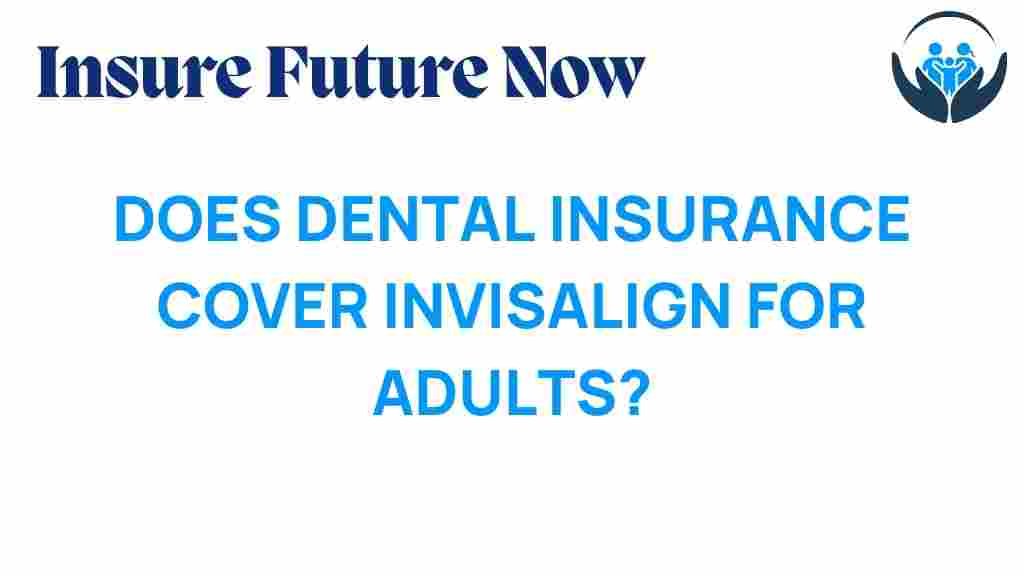Unveiling the Truth: Does Dental Insurance Cover Adult Invisalign?
When it comes to achieving a beautiful smile, many adults are turning to Invisalign as a popular orthodontic treatment option. However, a common question arises: does dental insurance cover adult Invisalign? Understanding this aspect of dental coverage is crucial for those considering Invisalign as a means to straighten their teeth. In this article, we will explore the relationship between dental insurance and Invisalign for adults, including the benefits, costs, and various treatment options available.
Understanding Dental Insurance and Orthodontics
Dental insurance is designed to help cover the cost of dental care, including routine check-ups, cleanings, and certain treatments. However, when it comes to orthodontics, coverage can vary significantly between different dental plans. Many insurance policies have specific clauses regarding orthodontic treatments, which can include traditional braces and, in some cases, clear aligners like Invisalign.
What is Invisalign?
Invisalign is a modern orthodontic treatment that uses a series of clear, removable aligners to straighten teeth. Unlike traditional metal braces, Invisalign aligners are virtually invisible, making them a preferred choice for adults who want to enhance their smile discreetly. The treatment involves wearing a series of custom-made aligners that gradually shift teeth into the desired position.
Does Dental Insurance Cover Adult Invisalign?
The answer to whether dental insurance covers adult Invisalign largely depends on individual dental plans. Here are some factors to consider:
- Type of Plan: Some dental plans specifically include orthodontic coverage, while others do not. It’s essential to review your plan’s details.
- In-Network Providers: Coverage may differ if you choose an in-network provider versus an out-of-network provider.
- Lifetime Maximums: Many orthodontic plans have a lifetime maximum benefit that applies to all orthodontic treatment, which could impact how much of the Invisalign treatment is covered.
Benefits of Invisalign
Invisalign offers several benefits that make it an appealing choice for adults seeking orthodontic treatment:
- Discreet Appearance: The clear aligners are nearly invisible, allowing adults to straighten their teeth without the noticeable look of traditional braces.
- Comfort: Invisalign aligners are made of smooth plastic, which is generally more comfortable than metal braces.
- Removable: Aligners can be removed for eating, brushing, and flossing, promoting better oral hygiene during treatment.
- Fewer Office Visits: Invisalign typically requires fewer visits to the orthodontist than traditional braces, as you can switch aligners at home based on your treatment plan.
Cost of Invisalign Treatment
Understanding the cost of Invisalign is crucial for adults considering this treatment option. The total cost can vary based on several factors, including:
- Severity of Alignment Issues: More complex cases requiring longer treatment times may increase the cost.
- Location: The geographical region can impact the pricing of orthodontic services.
- Provider Experience: An experienced orthodontist may charge more for their services.
On average, the cost of Invisalign treatment ranges from $3,000 to $8,000. It is advisable to consult with your dental provider for an accurate quote based on your specific needs.
How to Check Your Dental Insurance Coverage
To determine if your dental insurance plan covers adult Invisalign, follow these steps:
- Review Your Policy: Look for specific sections regarding orthodontic coverage. Some plans will explicitly state whether clear aligners are included.
- Contact Your Insurance Provider: Speak directly with your insurance company to ask about coverage for Invisalign. They can provide detailed information on your benefits.
- Consult Your Dentist or Orthodontist: Your dental provider can often help you understand your insurance benefits and may assist in filing claims.
Troubleshooting Common Issues with Dental Insurance and Invisalign
Even after determining your coverage, you may encounter some challenges. Here are some common issues and how to address them:
- Claim Denials: If your claim is denied, review the reason for denial. You can appeal the decision by providing additional documentation from your orthodontist.
- Limited Coverage: If your plan only covers a portion of the treatment, consider discussing financing options with your orthodontist to manage out-of-pocket costs.
- Changing Plans: If you switch dental insurance during treatment, check if the new plan covers your ongoing Invisalign treatment.
Alternative Treatment Options
If your dental insurance does not cover adult Invisalign or if the costs are too high, there are alternative treatment options to consider:
- Traditional Braces: Often more affordable, traditional braces may be covered by insurance and are effective for most orthodontic issues.
- Other Clear Aligners: Several other clear aligner brands may offer similar benefits to Invisalign, sometimes at a lower cost.
- Payment Plans: Many dental offices offer payment plans to spread the cost of treatment over time, making it more manageable.
Conclusion
In conclusion, whether dental insurance covers adult Invisalign largely depends on the specifics of your dental plan. It is essential to thoroughly investigate your policy, communicate with your insurance provider, and consult with your orthodontist to understand your options. With the various benefits that Invisalign offers, along with potential coverage from dental insurance, adults can navigate their orthodontic treatment effectively.
For more detailed insights on dental insurance options, consider visiting this resource. If you are considering Invisalign, consult with your orthodontist to explore your treatment options and financing solutions.
This article is in the category Coverage and created by InsureFutureNow Team
